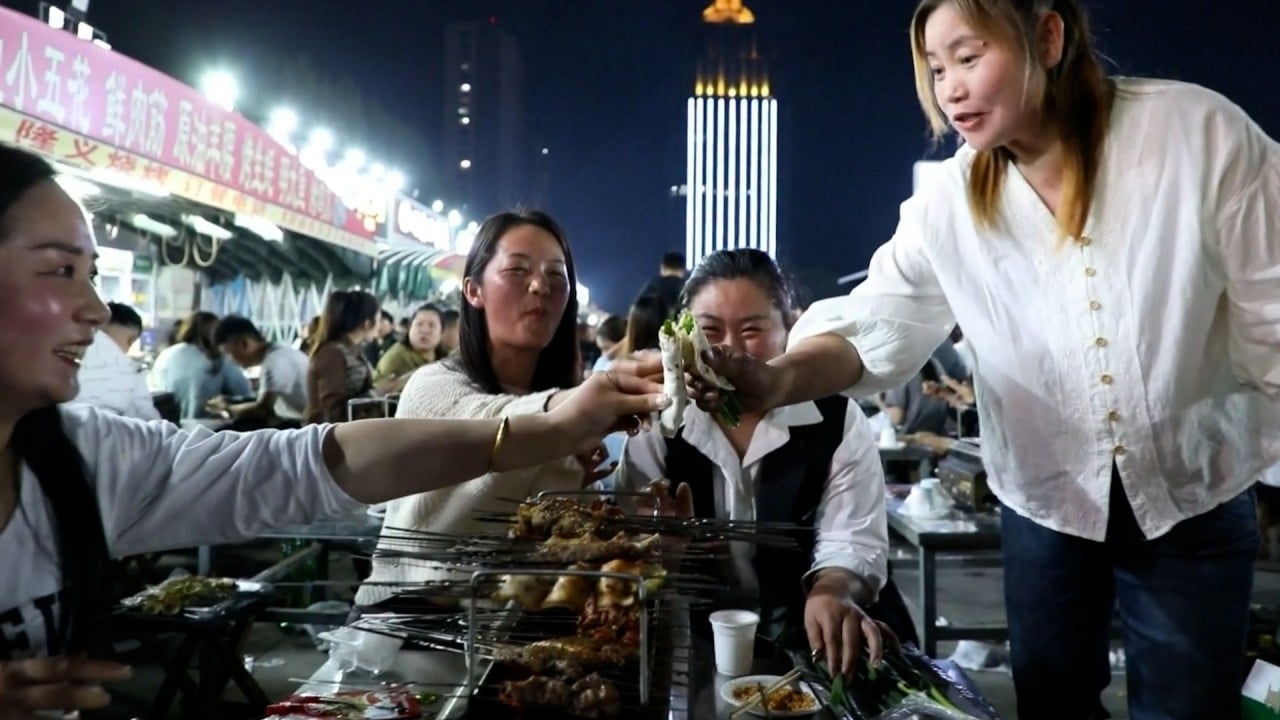How a lot these efforts have been paying off stays to be seen, however some perception ought to come from China’s anticipated launch of its quarterly gross home product (GDP) on Tuesday. And knowledge on retail gross sales and property funding could supply extra clues into whether or not shopper confidence has proven indicators of restoration.
China is aiming to maintain development at 5% in 2024. Are the percentages in its favour?
China is aiming to maintain development at 5% in 2024. Are the percentages in its favour?
Since final 12 months, Beijing has stepped up measures to spice up spending within the car, actual property and tourism industries as management tries to gasoline an financial system that has sputtered because the pandemic.
Whereas China’s middle-class inhabitants counts training and tourism as key areas during which they’d be keen to spend, job prospects have remained shrouded in uncertainty for a lot of Chinese language individuals.
What’s extra, the extended housing-sector downturn is forcing some householders to tighten their purse strings.
This contains Thomas Ma, a 41-year-old man who just lately misplaced his job in Guangdong. He took his redundancy severance and used it to repay debt, together with his housing, shopper and automotive loans.
Ma is now eager on promoting one in all his three properties, a small condominium that’s at the moment valued at 500,000 yuan (US$69,000) – far lower than the 800,000 yuan peak it reached a few years in the past.
Ma nonetheless intends to spend on his kids’s training however is trying to in the reduction of on every day bills and prohibit any household excursions to Guangdong or close by areas.
“Tutoring charges for youngsters are horribly excessive in large cities – as much as 1,000 yuan (US$138) a category,” Ma stated. “A month’s bills may price 4,000 yuan for a center college scholar. The scary half is that I’ve two sons.”
The findings from an intensive ballot of China’s middle-class members within the 25-45 age bracket, launched by finance and financial author Wu Xiaobo, indicated that a big portion of the group noticed their general wealth shrink final 12 months, main them to be extra cautious and conservative of their spending and funding.
Greater than 43 per cent noticed their wealth decline in 2023, in contrast with 31 per cent a 12 months prior and eight per cent in 2021, based on Wu’s annual “White Paper on the New Center Class”. It was primarily based on polls carried out from June to November and concerned city residents whose households earned at the least 200,000 yuan (US$27,600) a 12 months and owned at the least one piece of property and a car.
Job insecurity additionally loomed massive amongst these middle-class households. A complete of 43.4 per cent of respondents stated there had been lay-offs at their corporations final 12 months. It was unclear what number of interviews have been carried out final 12 months, however Wu’s newest report stated 500,000 individuals had been polled prior to now six years.
‘Dare not spend’: China seeks repair as slowing financial system could shrink center class
‘Dare not spend’: China seeks repair as slowing financial system could shrink center class
In the meantime, when it got here to investing, the report indicated that 46.1 per cent of middle-class households had turned extra conservative, with a much bigger emphasis being positioned on wealth preservation, and this marked a ten.6 share level improve from 2022. Quite the opposite, solely 9.8 per cent of respondents stated their funding perspective had turned extra constructive – down from 21.4 per cent in 2022.
And the proportion of those that stated they weren’t planning to buy property rose from 55.8 per cent in 2022 to 77.2 per cent in 2023.
Wu’s findings additionally indicated that childhood training and journey ranked as the highest two expenditures for middle-class households.
After 2022 was marred by zero-Covid restrictions that locked down in style locations throughout China, a whopping 48.8 per cent of middle-class individuals stated journey accounted for the majority of their annual consumption spending final 12 months.
Many analysts have stated {that a} normal insecurity in property and monetary markets is the principle motive Chinese language customers have been extra reluctant to tug out their wallets.
One brilliant spot in consumption has been gross sales of electrical automobiles (EVs) in China, however even that sector has discovered itself engulfed in controversy.
Buoyed by enormous investments in know-how and manufacturing, and benefiting from subsidies and supportive authorities insurance policies, EV manufacturing has grown so quickly that it has sparked home-grown considerations and accusations from overseas in regards to the potential fallout from provide overflows.
Beijing has additionally issued warnings in regards to the dangers of overcapacity in some sectors and the potential drag it may have on the nation’s financial restoration, as management highlighted throughout a key financial convention in December.
In March, China’s main EV producers reported a powerful rebound in deliveries after a gradual begin to the 12 months, however an ongoing worth conflict and the anticipation of beneficial measures by the Chinese language authorities to spice up automotive gross sales have put a giant query mark over the trade.
Li Ying, a 23-year-old contemporary graduate who’s at the moment on probation at her first job, working as a labour dispatcher for a state-owned firm in Guangzhou, has seen the development of extra individuals leaping on the EV bandwagon.
Li makes 5,000 yuan a month after tax and social safety funds.
“Ladies are striving to economize to purchase their first luxurious merchandise, and boys see electrical vehicles as the primary large buy of their lives,” Li stated, including that the majority of her friends have stated they don’t intend on shopping for actual property or settling down to begin a household.
“With the assistance of fogeys, a 100,000-yuan-plus finances for an electrical automotive is inexpensive. However I’m in no rush to purchase one, as a result of there are a number of home manufacturers to select from now, costs are getting cheaper, and the design and know-how are altering in a short time,” she stated, including that she makes about 5,000 yuan a month after taxes.
In December, a survey by the China Vehicle Affiliation confirmed that 41.2 per cent of customers would select to purchase a completely electrical car as their subsequent automotive, reasonably than a hybrid or fuel guzzler.
China’s US$28 billion abroad EV funding holding a cost regardless of backlash
China’s US$28 billion abroad EV funding holding a cost regardless of backlash
Corporations of all sizes are additionally making the shift. The motive force for an export-facing manufacturing facility in Dongguan, an industrial metropolis in Guangdong, stated quite a few petrol automobiles have been changed with electrical ones final 12 months.
“From the viewpoint of enterprise working prices, it is rather cost-effective, as a result of a petroleum automotive prices greater than 5,000 yuan a month to function, however an electrical automotive solely prices round 1,000 yuan. Our boss plans to switch all the vans with EVs,” the motive force added, talking on situation of anonymity.
However whether or not an uptick in consumption comes from tourism or electrical vehicles, China’s purpose to rely extra on customers to energy the nation’s financial system is unlikely to be a straightforward transition, based on analysts.
“The important thing dangers [for China] are weaknesses in property and consumption. They may result in decrease general development,” Louis Kuijs, chief economist for the Asia-Pacific area at Normal & Poor’s, stated in a analysis report late final month. “Furthermore, policymakers generally tend to reply to strains on development by stimulating funding, together with in manufacturing.
“This, then, additional will increase overcapacity in a number of items markets and squeezes costs and margins.”
In the meantime, tourism isn’t all the time a dependable engine that can persevere and maintain native economies indefinitely.
Yan Xu, deputy director of the Zibo Tradition and Tourism Bureau – in that metropolis with the barbecue-loving crowds – has publicly acknowledged that the surge in vacationers won’t be a everlasting fixture for the small industrial area of Shandong province.
Regardless of viral movies on social media igniting curiosity and drumming up curiosity, missing a 5A designation – the best score a tourism website can attain in China – is holding again Zibo’s development, Yan was quoted as saying by Hongxing Information, affiliated with the Chengdu Media Group, in January.
“The final word purpose is to enhance your entire metropolis’s infrastructure and enhance all tourism sources. On this method, not solely can vacationers get pleasure from a greater expertise, however the residing requirements of native individuals in Zibo can be improved,” Yan stated.
Nevertheless, even areas which have top-tier vacationer points of interest usually are not all the time in a position to flip them into large income drivers, based on analysts at CSCI Pengyuan, a Chinese language score company. Many such websites should depend on authorities subsidies, the staff stated in a November be aware.
Li Xunlei, chief economist at Zhongtai Securities, stated that prime saving charges, coupled with a comparatively low proportion of disposable earnings to gross home product (GDP) – a contributor to excessive family debt – are major causes that consumption stays weak in China.
Li estimated that consumption made up simply 54.7 per cent of China’s GDP in 2023, decrease than the 70-80 per cent seen in most developed and growing economies. And this, he stated, is a product of China’s long-held investment-driven development mannequin.
Don’t pin your hopes on consumption development in 2024
One other product of that mannequin has been the outsized reliance on low-end manufacturing, leading to a reasonable growth primarily based on low-cost labour, Li famous.
“Even electrical automobiles, lithium batteries and photovoltaic industries that at the moment supply nice benefits usually are not high-end industries, and a few core applied sciences haven’t been mastered,” Li stated.
Li was additionally sceptical in regards to the restoration of tourism in China, after evaluating the variety of travellers throughout this 12 months’s weeklong Spring Competition vacation with the identical interval in pre-pandemic 2019. Different knowledge level comparisons from main vacation durations prior to now half-year confirmed solely a partial restoration from 2019 ranges, Li stated in a be aware on March 24.
“Don’t pin your hopes on consumption development in 2024. In spite of everything, consumption depends upon residents’ earnings and the debt-service ratio, and these two indicators usually are not good,” Li stated, including that it was time for China to put the identical stage of emphasis on family spending to spice up development because it does on state investments.
“I consider that it is a nice alternative to extend residents’ earnings and slim the earnings hole by means of the reforms of the fiscal and taxation system.”


